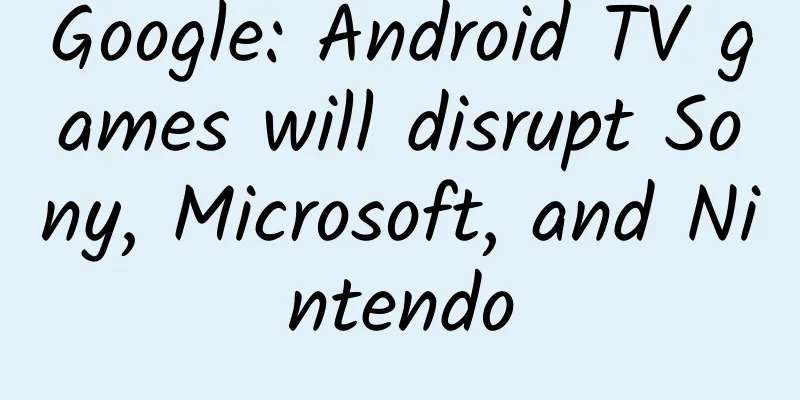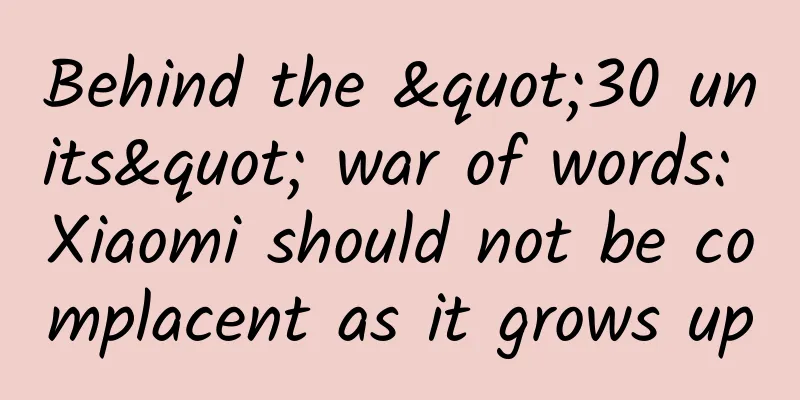Google: Android TV games will disrupt Sony, Microsoft, and Nintendo

|
In the early days of the video game industry, companies such as Nintendo, Sega, Sony and Microsoft made a fortune by creating closed ecosystems. In recent years, with the marriage of smart mobile devices and traditional game consoles, many game consoles such as Ouya, Mad Catz MOJO, Nvidia Shield and Amazon Fire TV have been created. This fall, as Google enters the field with its Android TV, game developers will be able to create cross-platform gaming experiences, allowing them to begin competing more directly with traditional console manufacturers. Fortune magazine had the following conversation with Chris McKillop, an Android TV game engineer at Google, on this issue, revealing the future of the industry. FORTUNE: New technologies from chip companies like Nvidia are affecting the gaming capabilities of Android smartphones and tablets. How quickly do you see that impact? McKillop: It's incredible. The latest generation of mobile system-on-chips (SoCs) now have GPUs that are as fast as or faster than the PlayStation 3 and Xbox 360. When the PS3 came out, Android 1.0 was still nearly two years away. It won't be long before mobile chips are as fast as the current fourth-generation systems (PlayStation 4 and Xbox One). Fortune: Do you think the gaming experience on Google Play has improved over the years? McKillop: The mobile gaming experience on Google Play has improved a lot. Android is a pure ecosystem, and it takes time for an ecosystem to move forward. I don't think there will be any restrictions on game developers when developing new games for Android. As more phones and tablets start to be equipped with processors and graphics chips that can support high-resolution games, developers will have a greater incentive to enter Google Play. Fortune: What opportunities does Android open up for game developers, especially small teams? McKillop: There are a lot of small teams (sometimes just one developer) doing great things. Because the Google Play Store provides developers with extremely fast turnaround time for releasing updates and new games, it is easier for those small teams to have a greater impact. Another opportunity is free games. Fortune: How do you think Android TV will impact the current gaming ecosystem, which is (largely) split between mobile, console, and PC games? McKillop: Over the past year, I've had the opportunity to talk to game developers from all three of these areas. Mobile developers are excited about more screens running Android. We don't know exactly how console gamers will enter this space yet, but as Android TV develops, we'll know the answer. We have some ideas that I'm excited to see become a reality over the next few years. Fortune: What makes the big-screen gaming experience different from the mobile gaming experience today? McKillop: Input systems and power consumption. Mobile games are basically touch-based and battery-powered. But once it comes to the living room, developers will see controllers and remotes, and the system will use AC power, which will make the chips run faster and last longer. For some developers, this will be the first time they have to consider non-touch gaming. For others, it will be like a step back in time. Android has not yet determined standards for keyboard layouts and how controllers work. This makes it difficult for developers to develop for controllers, so they either do one-offs for a certain brand or don't think about controllers at all. Android TV will give them a reason to make controllers work, which will directly lead to controller games on phones and tablets. That's the power of a single platform across form factors. Fortune: How do you think a smaller gaming console like Android TV will change that? McKillop: Android TV is more than just an OS for small game consoles. It's about bringing Android to the big screen in the living room - on a TV, cable box, streaming media player or small game console. Having a standard platform for all these devices will have the same impact on the living room as it did on the phone in 2008. This will be a huge win-win for developers and consumers, and will raise expectations for everyone involved. Fortune: How did your collaboration with Nvidia on Android TV come about? McKillop: We have been working closely with NVIDIA. The people at NVIDIA really understand games and gamers - it's in their DNA. They have been helping us work with game developers and have helped us optimize the graphics performance of the developer prototype we released at Google IO. We also work with multiple vendors in the graphics chip industry, including Qualcomm, ARM, Intel, and others. Fortune: What experience does Nvidia’s K1 chip bring to game console players? McKillop: It brings third-generation console and PC-class gaming performance to mobile phones and small consoles. We built a prototype with Nvidia, and at Google Developers Conference, the folks at Epic Games used Unreal Engine 4 to show what players will experience on that prototype. Fortune: When it comes to choosing between touchscreen and physical controllers, game developers are creating games for both phones and Android TVs. What do you think of this phenomenon? McKillop: Ideally, a game should work on both platforms. Since the physical controller for Android TV consoles also works on phones and tablets, developers can invest in games that work on all devices. In the Preview Play Store, the vast majority of games for Android TV are the same games you install on your phone and tablet. I can see a lot of kids going to school next year with tablets and two controllers. Fortune: How will technologies like Unreal Engine 4 bring new opportunities for cross-device and cross-platform gaming experiences? McKillop: When game developers invest in technology like Unreal Engine 4, it can reach a much larger market at a lower incremental cost. When you combine that with systems like Google Play Games Services, you can really do interesting things with cross-platform, cross-device, multi-player games. Fortune: How do you think the gaming experience will improve as players have the ability to play on the go and then continue playing on the big screen when they get home? McKillop: Most games have cloud solutions like Play Games Services that allow you to keep your game state when you get a new phone, so you don't lose your progress. Since we're using the same core platform for Android TV, all of the same technologies are still available. Developers love the idea of buying a game for the TV and installing it on their phone, or vice versa. You'll find us continuing to invest heavily in developing these cross-device experiences. Fortune: One of the main challenges facing game developers on Android right now is the number of different devices. It’s been said that a unified platform like Android TV would make it easier for developers to focus on creativity rather than adapting to a large number of ports. What do you think of this? McKillop: In the Android TV specs, we have CPU and GPU performance requirements. We want developers to know that they can run at a lower end. There will always be devices that exceed those specifications, and there will always be developers who want to take advantage of that. This is very similar to the PC gaming space, which has worked well for many years. I think game developers will really like this approach. Fortune: With technology like the K1 chip advancing by leaps and bounds over the past few years, how do you think more advanced and complex games will affect the traditional console space dominated by giants like Sony, Microsoft, and Nintendo? McKillop: Technology always disrupts existing industries. You only need to look at the mobile phone space and compare the popular models in 2006 with the popular models in 2014. I don't think the living room will be any different, but it's impossible to predict who will win or lose. Wait five or six years and then look back. Fortune: How did you work with game developers to build Android TV? McKillop: We started identifying game developers almost a year ago and disclosed our plans to close partners. We also worked closely with Nvidia and its current Nvidia Shield developers to adapt their apps for non-touch. Probably the best part of building Android TV was how positive and supportive different game developers were around our efforts. Android has an incredible developer relations team made up of many dynamic gamers. As a winner of Toutiao's Qingyun Plan and Baijiahao's Bai+ Plan, the 2019 Baidu Digital Author of the Year, the Baijiahao's Most Popular Author in the Technology Field, the 2019 Sogou Technology and Culture Author, and the 2021 Baijiahao Quarterly Influential Creator, he has won many awards, including the 2013 Sohu Best Industry Media Person, the 2015 China New Media Entrepreneurship Competition Beijing Third Place, the 2015 Guangmang Experience Award, the 2015 China New Media Entrepreneurship Competition Finals Third Place, and the 2018 Baidu Dynamic Annual Powerful Celebrity. |
<<: Will anonymous group chat become the next social hotspot?
>>: iPad mini3 is destined to become the next Apple iPod
Recommend
A complete guide to selling goods in private domain "welfare groups"
Community is one of the necessary operating metho...
5 formulas to analyze the growth secrets of soul APP
As a stranger social product, Soul has establishe...
Event planning: the underlying logic of events common to 360 industries
This article uses an interesting story in the for...
Can you still eat the leftover food from the Chinese New Year? Does it really cause cancer? Tell your parents right away
Expert of this article: Fu Shufang, Master of Foo...
Himalaya: The highest level of ASO, how does Himalaya promote its apps?
The ASO master we are going to talk about today i...
How to increase user growth?
In recent years, "growth hacking" and &...
Yinchuan WeChat ordering software mini program, how much does the WeChat mini program for ordering food cost?
Everyone is familiar with WeChat mini-programs . ...
Detailed explanation of Windows 10's Wi-Fi sharing feature
Ever since Windows 10 officially debuted last wee...
IQIYI Universal Broadcast Baidu Netdisk Download Unlimited Speed _Taoduoduo
Everyone knows that iQiyi and Baidu are actually ...
8 kinds of food that you thought were spoiled but are actually safe to eat! Throwing them away is a big loss
Mr. Wang Zengqi once said that winter cabbage tas...
Apple vs. Google: Who will be the leader in AI?
If, like me, you think of the tech market as a co...
APP user growth: How to use data analysis to improve user growth?
How can we make our APP stand out among a large n...
12,000 words to fully interpret Perfect Diary: from organizational structure to growth strategy
As a growth engineer and a straight man, I focus ...
Amazon and Bezos are in great glory, but they are embarrassed in China
Amazon CEO Bezos has been all over the news on CN...
33 essential professional terms for information flow advertising, you may not have heard of the first one!
Today, we have compiled 33 professional terms tha...









